Politics
About Andrew Cusack
 Writer, web designer, etc.; born in New York; educated in Argentina, Scotland, and South Africa; now based in London.
Writer, web designer, etc.; born in New York; educated in Argentina, Scotland, and South Africa; now based in London. read more
News
Blogs
Reviews & Periodicals
Arts & Design
World
France
Mitteleuropa
Knickerbockers
Argentina
The Levant
Africa
Cape of Good Hope
Netherlands
Scandinavia
Québec
India
Muscovy
Germany
Academica
Debating Hiroshima
Christian morality versus modern relativism
THREE YEARS AGO over on the New Criterion’s blog, Armavirumque, my friend and then-colleague & boss Roger Kimball and I had an interesting exchange on the morality of the bombing of Hiroshima. The debate began when Roger wrote a blog entry citing an opinion piece from Oliver Kamm of the Guardian supporting President Truman’s decision to drop the Bomb. I then responded with a post of my own pointing out that the conservative reaction at the time was one of horror at the moral depravity to which we had descended, and that the it-would-have-been-worse-if-we-didn’t school of thought essentially can be reduced to an ends-justifies-the-means argument. Roger then responded with a post arguing that, well, sometimes the ends do justify the means.
Regardless of one’s thoughts on the Hiroshima bombing, arguing that the ends justifies the means is one of the cornerstones of relativism. Christians believe that we are not allowed to do evil, even if that evil may serve a good cause. It is not simply a matter of choosing something bad over something worse. Evacuating the British Army from Dunkirk, for example, was bad, but leaving it there was worse. Yet, both were morally licit options for Churchill to make, though the prudential evidence supported the former option rather than the latter.
Innocent people inevitably die in most wars, but that cannot excuse the deliberate and intentional targeting of an entire city for destruction by a military force. That so many American Christians still excuse the bombing of Hiroshima and Nagasaki is frightening evidence that America has convinced Christians to be Americanised rather than Christianity convincing America to be Christianised. (more…)
Thomas Molnar, 1921–2010
The Catholic philosopher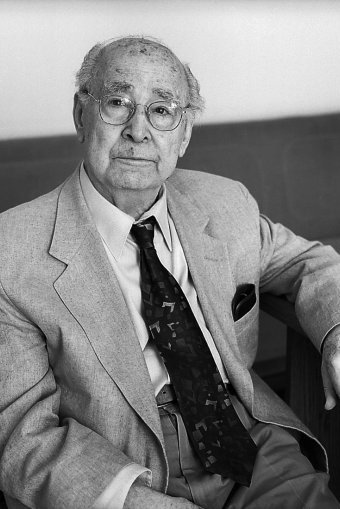 and historian Thomas Molnar died last week in Virginia at eighty-nine years of age, just six days short of reaching his ninetieth year. Born Molnár Tamás in Budapest in 1921, the only son of Sandor and Aranka, Molnar was schooled across the Romanian border in the town of Nagyvárad (Rom.: Oradea) in the Körösvidék, a region often included in Transylvania and an integral part of Hungary until the Treaty of Trianon cleaved it a year before. In 1940 he moved to Belgium to begin his higher education in French, and as a leader in the Catholic student movement he was interned by the German occupiers and sent to Dachau. With the end of hostilities, he returned to Brussels before arriving home in Budapest to witness the gradual Communist takeover of Hungary.
and historian Thomas Molnar died last week in Virginia at eighty-nine years of age, just six days short of reaching his ninetieth year. Born Molnár Tamás in Budapest in 1921, the only son of Sandor and Aranka, Molnar was schooled across the Romanian border in the town of Nagyvárad (Rom.: Oradea) in the Körösvidék, a region often included in Transylvania and an integral part of Hungary until the Treaty of Trianon cleaved it a year before. In 1940 he moved to Belgium to begin his higher education in French, and as a leader in the Catholic student movement he was interned by the German occupiers and sent to Dachau. With the end of hostilities, he returned to Brussels before arriving home in Budapest to witness the gradual Communist takeover of Hungary.
Molnar left for the United States, where he earned his Ph.D. from Columbia University in 1950. He frequently contributed to the pages of National Review after its foundation by William F. Buckley in 1955, and his periodic writings were often found in Monde et Vie, Commonweal, Modern Age, Triumph, and other journals. From 1957 to 1967 he taught French & World Literature at Brooklyn College before moving on to become Professor of European Intellectual History at Long Island University. In 1969 he was a visiting professor at Potchefstroom University in the Transvaal. In 1983 he was awarded an honorary doctorate by the University of Mendoza in Argentina while he was a guest professor at Yale. After the fall of the Communist regime in Hungary, he taught at the University of Budapest and at the Catholic University (PPKE). In 1995 he was elevated to the Hungarian Academy of Arts.
While his first book, Bernanos: his political thought and prophecy (1960), was well-received, it was Molnar’s second published work that was arguably his best known. The Decline of the Intellectual (1961) was, in Molnar’s own words, “greeted favorably by conservatives, with respectful puzzlement by the left, and was dismissed by the liberal progressives.” Gallimard began discussions to print a French translation as part of its prominent Idées series, before the publisher’s in-house Marxist Dionys Mascolo vetoed it for its treatment of Marxism as a utopian ideology. The celebrated & notorious Soviet spy Alger Hiss complimented it in a Village Voice review, but Molnar noted that The Decline of the Intellectual‘s harshest criticism came from liberal Catholic circles. “Obviously,” he wrote, “in that moment’s intellectual climate, they would have preferred a breathless outpouring of Teilhardian enthusiasm.”
The book argued, from a deeply conservative European mindset, that the rise of the intelligentsia during the nineteenth century was tied to its capacity as an agent of bourgeois social change. As the intellectual class increasingly shaped the more democratic, more egalitarian (indeed, more bourgeois) world around it, the intelligentsia’s vitality, so tied to its capability to enact social change (Molnar argued), became self-destructive. The “decline” set in as the intelligentsia searched for alternative methods of social redemption in increasingly extreme fashions (such as nationalism, socialism, communism, fascism, &c.) and led to the intellectuals allying themselves with ideology, which is the surest killer of genuine intellectual and philosophical speculation.
The same year Molnar’s The Future of Education was published with a foreword by Russell Kirk, whose study of American conservative thinkers, The Conservative Mind, was admired by Molnar. Among the many works that followed were Utopia, the perennial heresy (1967), The Counter-Revolution (1969), Nationalism in the Space Age (1971), L’éclipse du sacré : discours et réponses in 1986 with Alain Benoist, and the following year The Pagan Temptation refuting Benoist’s neo-paganism, The Church, Pilgrim of Centuries (1990), and in 1996 Archetypes of Thought and Return to Philosophy. From then until his death, the remainder of his new books have been published in his native Hungarian language.
Molnar and his work have become sadly neglected for the very reasons he detailed in his major work: the overwhelming triumph of ideology over the intellectual sphere. While Russell Kirk defined conservatism as the absence of ideology, modern conservatism in America has become almost completely enveloped by ideology, and the Molnar’s deep, traditional way of thinking — influenced to a certain extent by de Maistre and Maurras — is now met more by silence and ignorance than by direct condemnation.
The triumph of ideology (be it on the left or the right) was aided and abetted, Molnar argued, by a culture dominated by media and telecommunications. “Around 1960,” Professor Molnar wrote later in his life, “the power of the media was not yet what it is today.”
Hardly anybody suspected then that the media would soon become more than a new Ceasar, indeed a demiurge creating its own world, the events therein, the prefabricated comments, countercomments—and silence. … The more I saw of universities and campuses, publishers and journals, newspapers and television, the creation of public opinion, of policies and their outcome, the less I believed in the existence of the freedom of expression where this really mattered for the intellectual/professional establishment. For the time being, I saw more of it in Europe, anyway, than in America: over there, institutions still stood guard over certain freedoms and the conflict of ideas was genuine; over here the democratic consensus swept aside those who objected, and banalized their arguments. The difference became minimal in the course of decades.
Needless to say, the world of American conservatism has been silent in responding to the death of Professor Molnar.
Ideology’s enforced forgetfulness aside, Molnar’s native Hungary renewed its appreciation for him just before his death: last year the Sapientia theological college organised the first conference devoted to his works, which was well-attended and much commented-upon in the Hungarian press. Besides his serious corpus of works, Molnar is survived by his wife Ildiko, his son Eric, his stepson Dr. John Nestler, and his seven grandchildren.
Requiescat in pace.
Previously: Understanding the Revolution
Elsewhere: Professor Thomas Molnar, In Memoriam
Interesting Things Elsewhere
This determined Celt is gunning for Thabo
Kevin Bloom | The Daily Maverick
Ireland’s  Paul O’Sullivan took over as head of security at South Africa’s airport authority in 2001, and discovered something was wrong from the start: why didn’t the policeman on duty want to take a statement about the attempted theft of his baggage? Since then, his life has been a series of bizarre events leading him ever deeper into the most complex criminal network of the post-apartheid era, including the recent the trial and conviction of former national police chief Jackie Selebi. But O’Sullivan’s determined quest to expose crookedness isn’t over yet, and he now has former president Thabo Mbeki in his sights. read more
Paul O’Sullivan took over as head of security at South Africa’s airport authority in 2001, and discovered something was wrong from the start: why didn’t the policeman on duty want to take a statement about the attempted theft of his baggage? Since then, his life has been a series of bizarre events leading him ever deeper into the most complex criminal network of the post-apartheid era, including the recent the trial and conviction of former national police chief Jackie Selebi. But O’Sullivan’s determined quest to expose crookedness isn’t over yet, and he now has former president Thabo Mbeki in his sights. read more
The apparatus of state will simply ignore the government
‘Inspector Gadget’ | Police Inspector Blog
Police across England were told by the responsible minister of the democratically elected government that they must not chase performance targets any longer. “I can also announce today that I am also scrapping the confidence target,” said the Home Secretary, Theresa May, “and the policing pledge with immediate effect”. But the ‘senior management team’ of the West Yorkshire Police have stated they will go on no matter what the government says. read more
Has Christian Democracy reached a dead end?
Jan-Werner Mueller | Guardian.co.uk
The commentator completes a brief survey of the struggles of Christian Democracy in Germany and Europe today. The French leader Georges Bidault claimed that Christian Democracy meant “to govern in the centre, and pursue, by the methods of the right, the policies of the left”. But Christian Democracy’s brief French moment in the 1950s didn’t survive the return of de Gaulle, and Christian Democratic parties on the continent today face an existential crisis. read more
Also: Monsignor Ignacio Barreiro’s talk at the Roman Forum’s 2010 Summer Symposium, entitled The Problem of Christian Democracy will be made available online in audio form sometime in the coming months.
Deep in Shanxi, the most Catholic village in China
Anthony E. Clark | Ignatius Insight
Church after church dot the landscape and high steeples rise above small villages as they do in southern France. Passing through a narrow side road one arrives and is welcomed by three great statues at the village entrance: St. Peter holding his keys is flanked by Saints Simon and Paul. Thirty minutes before Mass the village loudspeakers, once airing the revolutionary voice of Mao and Party slogans, now broadcasts the rosary. Welcome to Liuhecun, the most Catholic village in China. read more
Look for me in the Cotswolds.
Dino Marcantonio
The apologists for modernist architecture have tried for a century to gain public acceptance of and appreciation for their horrors. While the elites have almost overwhelmingly been converted, the general populace around the world still sees that the Emperor has no clothes, and almost always prefers architecture that reflects the tried and true, the local and the natural. Alain de Botton, the Swiss essayist, ‘pop philosopher’, and former ‘writer-in-residence’ at Heathrow Airport, is the latest to give it a go, this time in the pages of the modernist Architectural Record. Dino Marcantonio provides a most useful fisking. read more
Canada is a French country
Andrew Coyne | Maclean’s
At the recent Canada Day celebrations on Parliament Hill, Canadian PM Stephen Harper spoke of “the steadfast determination and continental ambition of our French pioneers, who were the first to call themselves ‘Canadians.’” At other times he has spoken of Canada as having been “born in French,” of French as “Canada’s first language,” and, most famously, of Quebec City as “Canada’s first city,” its founding in 1608 as marking “the founding of the Canadian state.” While the sentiment may seen anodyne, moreover, the implications are radical. read more
Pure Democracy
“My firm conviction is that we of the conservative camp must put ourselves entirely onto a democratic basis. After the collapse of the old conditions nothing else can provide us with a future and a justification except pure democracy. Even if democracy has a dark side it is preferable to the quasi-democratic aristocracy of the representative system.” — Philipp Anton von Segesser, 1866
The Franco-Yorkshireman Jerome di Costanzo has an interesting article at OurKingdom on “You the People” Conservatism, interesting for the most part in that it has introduced me to Philipp Anton von Segesser, whom I had never heard of. I question, however, whether Jerome is correct to imply that Herr von Segesser and Mr. Cameron are quite such birds of a feather. The brilliance of the Swiss model — which Jerome rightly extols — is its democratic localism. But the Prime Minister is now seeking to introduce legislation which would set minimum prices for alcohol to avoid the almighty glut of cheap drink which (along with 24-hour openings) has contributed to the transformation of many British town centres into no-go-zones of public inebriation.
Would not the Swiss solution, instead, have been to merely devolve power either to counties (which barely exist anymore, and whose borders are in a state of permanent revolution) or to local town councils, and to allow them to react to the situation on the ground in a manner they deem appropriate?
Also, as Paul Mallinder points out, the government is attempting to solve a problem with a law, when really the only solution is a virtue. Virtues, though, are society’s responsibility, not the government’s. If people continually look to the government to solve problems by passing legislation instead of transforming society themselves by inculcating and promoting virtue, they deserve the nightmarish state they will end up with.
Frederik van Zyl Slabbert, 1940–2010
FREDERIK VAN ZYL SLABBERT, former South African parliamentarian, politician, and briefly chancellor of Stellenbosch university, died last week in Cape Town. ‘Van’, as he was known, was convinced after a night of heavy drinking to stand as a parliamentary candidate for the Progressive Party in 1974 and won a surprise victory in the Rondebosch constituency against the United Party incumbent by 1,600 votes. Within three years he became head of the merged Progressive Federal Party, and became Leader of the Opposition in the House of Assembly in 1979.
Koos van der Merwe, currently Chief Whip of the Inkatha Freedom Party, served in parliament alongside the liberal van Zyl Slabbert while the former was still a member of the Conservative Party. “He was a parliamentarian par excellence,” van der Merwe said after Van’s death, “and I remember how once, in a mere three-minute speech, he practically annihilated P. W. Botha.”
Despite wide acclaim as one of the finest debaters in parliament, van Zyl Slabbert shocked the political establishment in 1986 by resigning because he was convinced that parliament had become irrelevant to the running of the country. His resignation nearly ruined the PFP and frayed van Zyl Slabbert’s relationship with his fellow MP, the late Dame Helen Suzman.
Just a year later he organised the first meetings between members of the banned African National Congress and a group of National Party politicians, Afrikaner academics, and businessmen. In later years he co-founded a black investment trust, was appointed chairman of the Johannesburg Stock Exchange, sat on the boards of a number of South African corporations, and worked for the Open Society Foundation. Van Zyl Slabbert was appointed Chancellor of the University of Stellenbosch — for whom he had played rugby as an undergraduate — in 2008 but resigned for health reasons a year later, and was succeeded by Johann Rupert.
Mr. van der Merwe continued:
What amazed me about Van Zyl Slabbert was the depth of his political knowledge and his wisdom. He knew and understood the policies of each political party better than they did themselves. On one occasion, at a seminar in Williamsburg in the U.S.A., I represented the Conservative Party and was confronted with questions I could not answer. I asked to be excused for a few minutes and went to van Van Zyl Slabbert and asked him how I, as a Conservative MP, should answer. He immediately gave me the right answers because he fully understood the views and beliefs of the Conservatives. And for that matter, each and every political party. He was in fact a mobile political library.
When the late Dr Treurnicht’s daughter approached Van Zyl Slabbert for assistance to move to the U.S.A. to marry a black man, Van Zyl Slabbert did not use that information against Treurnicht. At that stage, it was unthinkable for a white Conservative to marry a black man. News of Treurnicht’s daughter marrying a black man would have led to the end of Treurnicht’s political career. Van Zyl Slabbert confidentially told me the story but it never made the headlines. What an honourable man!
His part in the struggle for Afrikaans at Stellenbosch was indeed an eye opener. Where were the Verkramptes? The old Conservatives of which I was a member? Nowhere. The fight for Afrikaans was led by the “liberal jingoes” such as Van Zyl Slabbert, Hermann Giliomee, and Breyten Breytenbach. …
I also never once saw him angry.
Mooi loop, Van Zyl. Koos gaan jou mis.
Requiescat in pace.
Altered States in the WSJ

Here’s one for Strange Maps. An interesting article in today’s Wall Street Journal, the Saturday edition, focuses on attempts to realign state borders by seceding from one to state to form another or by merging parts of multiple states to form a new entity. There are two errors, one by the author, Michael J. Trinklein, and one by the illustrator, John Burgoyne. (more…)
The Clootie Dumpling
 IT IS A DESIGN masterstroke, combining simplicity and ease of recognition with layers of symbolism. The emblem of the Scottish National Party is just one single line that descends, turns around, and crosses itself, but while remaining uncomplicated manages to evoke the Saltire (Scotland’s flag), the thistle (Scotland’s flower), and — the pudding which has given the logo its nickname — the clootie dumpling, a Scots specialty. And yet, despite its ubiquity, there is surprisingly little to be found online about the history of the SNP’s clootie dumpling.
IT IS A DESIGN masterstroke, combining simplicity and ease of recognition with layers of symbolism. The emblem of the Scottish National Party is just one single line that descends, turns around, and crosses itself, but while remaining uncomplicated manages to evoke the Saltire (Scotland’s flag), the thistle (Scotland’s flower), and — the pudding which has given the logo its nickname — the clootie dumpling, a Scots specialty. And yet, despite its ubiquity, there is surprisingly little to be found online about the history of the SNP’s clootie dumpling.
The emblem was commissioned by William Wolfe (right) in 1962 for the parliamentary by-election in which he was standing as the Scottish Nationalist candidate. The party had typically employed a lion rampant as its symbol, which Wolfe thought too complex, and got Julian Gibb (in his own words, “scarcely out of childhood”) to design the brilliantly simple logo. “A political visionary with an eye for iconography,” according to Gibb, Wolfe used the emblem in the unsuccessful by-election campaign and a year later successfully proposed it to the party for adoption as the party emblem.
“The adoption of a geometric logotype is a bold act for a political organisation, especially a nationalist one, with the swastika a not too distant memory,” writes Gibb. “But the inner logic of the thing was persuasive. Forbye imagined allusions to saltire, thistle, and clootie dumpling, there was perhaps something irresistible about virile angularity supported on swelling curvature, implying among other things that in this outfit, the mechanistic depended on the organic. At one end of the scale of application it was devised to be hastily slapped on walls with a furtively loaded brush (the aerosol age had yet to come) and a quick flick of the wrist – no skill required. Try doing that with the lion rampant.” (more…)
Socialism is Failing our Native Americans
John Stossel reports on the disastrous effect of government dependency on America’s native tribes, only the latest chapter in this country’s lamentable treatment of its first inhabitants.
Scotland’s Three Parliaments
All of Them More Beautiful than the Current Parliament Building

IT IS ONE OF those curious aspects of Edinburgh: its multiplicity of parliament buildings. The Estaits of Parliament, as they were known in the old days — consisting of the three estates of prelates, lairds, and burghers — first met in the Great Hall of Edinburgh Castle in 1140, though the first gathering of which we have primary source material was at Kirkliston in 1235, during the reign of Alexander II. The body led a somewhat peripatetic existence, meeting wherever was convenient, and even met for a year in St Andrews, where the building which housed it is still known as Parliament Hall. Indeed, that august edifice is home to the proceedings of the Union Debating Society, where the germinal gasbags of Scotland, and indeed of all three kingdoms, first enter the fray of political discourse.
In 1997, nearly three-hundred years after the Parliament was abolished, it was decided to bring it back, albeit in much reduced form. Great were the rumours and discussions about what effect the return of legislative power might have on the country, and Edinboronians pondered where the body might be housed. There were obvious choices, and less obvious choices, but in the end the Westminster government decided to go for the choice that hadn’t been suggested at all and built one of the most heinous offences against the sensibilities of taste that the land has ever seen. And so, the fact is that Scotland has three beautiful parliament buildings, none of which it uses. (more…)
Brothers Aboard the Ship of State
The Viscount Philippe de Villiers is an MEP, sometime French presidential candidate, and head of the Mouvement pour la France but his brother, General Pierre de Villiers, has just been named personal Chief of Staff to the President of the Republic (whose name we refrain from mentioning, lest we feel compelled to boo and hiss). Given this recent appointment, we reckon that General de Villiers outranks his brother in the grand apparatus of state; Chef d’etat-major particulier beats President of the General Council of the Vendée.
There is, however, at least one regard in which the civilian has his military brother beat: Pierre only has six children, Philippe has seven.
‘The Splintering Rainbow’

The veteran South African journalist Rian Malan last year made a documentary for Al Jazeera on recent events in the country. It’s an interesting and well-balanced programme that presents multiple points of view. Importantly, it avoids the all-too-frequent stereotyping of the Mbeki/Zuma rivalry. It also includes a scene of Hellen Zille speaking (in English) to Stellenbosch students in the Sanlam Saal of the Neelsie.
The 45-minute documentary is available in four parts on YouTube below. (more…)
La Bandiera dell’Io Amo L’Italia

In most countries, the voter of sound mind and disposition is hard pressed to find a political party worthy of his vote. One of the charming aspects of Italy is that the inverse is true: there are usually at least half-a-dozen political parties worth voting for, sound in policies and public morals, though the more recent trend has been towards amalgamation. It nonetheless often seems that every Italian of public stature has, at some time or another, founded his own political party.
Readers will no doubt recall the Holy Father’s rather brave baptism of the Egyptian-born Italian journalist Magdi Allam during the Easter Vigil of 2008. Signore Allam has proven his Italicity by following the peninsular trend of founding one’s own political party. Founded as Protagonisti per l’Europa Cristiana (Protagonists for Christian Europe), Allam’s party is now known as Io Amo L’Italia (I Love Italy). The party has had an early success in that its founder was elected to the European Parliament in the most recent elections, and he caucuses with the Christian-democratic Unione di Centro in the continental assembly.
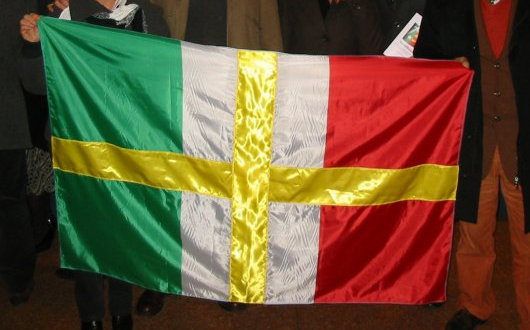
Anyhow, the relevance for us is that Magdi Cristiano Allam’s political party has adopted a “baptized” tricolore of its own: the green-white-red tricolour defaced (as is the proper vexillological term) with a simple golden cross the arms of which reach to the ends of the field. A very simple solution, and not half bad really. One of the party’s Facebook followers suggests having a tricolore with a Constantinian-style cross in the center, which is another not half bad idea.
30,000 More into the Mouth of Moloch

Earlier this month, as part of his policy to appear ever more like his predecessor, President Obama announced his new Afghanistan strategy. The President exhibited his environmentalist credentials by craftily recycling the lamentable Bush plans for an Iraq “surge” and rehashing them for use in Afghanistan. The happy result is that Obama’s approval ratings have nose-dived — again, the similarities to former president G.W. Bush are striking.
“Barack Obama has found his Vietnam moment,” reports the redoubtable Gerald Warner. “His West Point speech was a travesty of dishonesty, indecision, half-measures and vicious partisanship.”
“To say he was economical with the truth would be putting it mildly. The porkie count was astronomic. In his rampantly partisan style he claimed of the Bush administration: ‘Commanders in Afghanistan repeatedly asked for support to deal with the re-emergence of the Taliban, but these reinforcements did not arrive.’ Not true. The Bush administration never hesitated to commit troops to Middle Eastern killing grounds: that was one of its worst defects.” (more…)
Kiest Welter
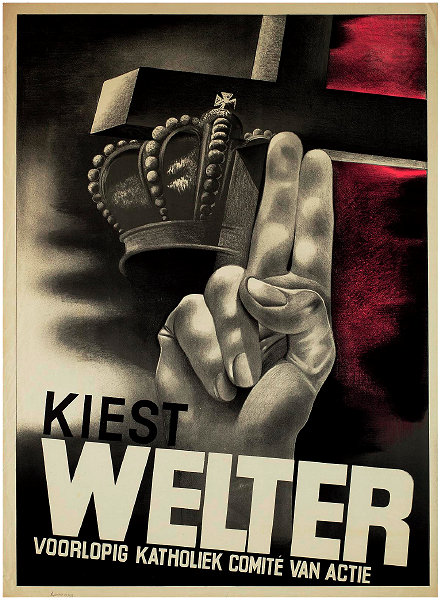
Christianity — Monarchy — Loyalty. This Dutch election poster urges voters to “Choose Welter”, referring to the sometime Dutch government minister Charles Welter. (more…)
A Tale of Two Headscarves
In Deference to Islam, U.S. Secretary of State Dons Headscarf, while that of Canadian Governor-General Michaëlle Jean is Conspicuous in its Absence
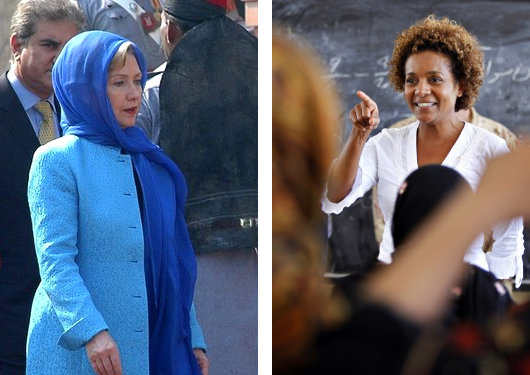
In the clash of civilisations between Islam and “the West”, there are Churchills and there are Chamberlains. A recent New York Times front-page photo shows U.S. Secretary of State Hillary Clinton donning a headscarf on her recent visit to Pakistan. But Michaëlle Jean, Canada’s Governor-General (and thus that country’s highest-ranking official after the Queen), recent journeyed to the “Af-Pak” region herself. Photos released by Rideau Hall show Her Excellency breezily taking questions from girls in an Afghan school build with Canadian development funds. The photos show a woman who appears free, confident, and easily engaged by her interactions with those around her. The contrast with Secretary Clinton couldn’t be greater.
The advice si fueris Romae, Romano vivito more, traditionally attributed to no less a sage than St. Ambrose, is sound counsel indeed, but one can’t help but wonder if in this circumstance the Governor-General’s way is the more appropriate one. How rare it is that we find Western leaders with enough self-assurance not to pander deferentially towards a culture alien to our own. Secretary of State Clinton, in her headscarf, broadcasts the signal that she is following an agenda set by others, whereas Governor-General Jean chooses to set the agenda herself — fitting for the viceroy of one of the most stable countries in the world, that enjoys an enviable constitutional longevity.

Still, the Governor-General’s head did not remain bare for the entirety of her visit to Afghanistan. Her Excellency is Colonel-of-the-Regiment of the three units of Canada’s household guard, and, donning the military beret, Madame Jean visited a memorial to the soldiers of her country who have given their lives in the endless conflict in Afghanistan. After the proper solemnities were observed, the Governor-General took a few moments to meet with some of the Canadian soldiers who stood guard during the ceremony.

The World Turned Upside Down

— philosopher George Santayana
I can’t remember who it was that, watching the fall of the Berlin Wall and the collapse of the Iron Curtain, said never in his right mind did he expect that within just a decade Washington would be the chief propagator of worldwide revolution and the Kremlin would be a relatively conservative power, guarding jealously its local sphere of influence. What could add more of a dash of the absurd (and yet, eminently sensible) than the Russian government, facing the worst crisis of population decline of any major power, promoting larger families with a poster campaign quoting the conservative American philosopher George Santayana.
The Freiherr of Finance
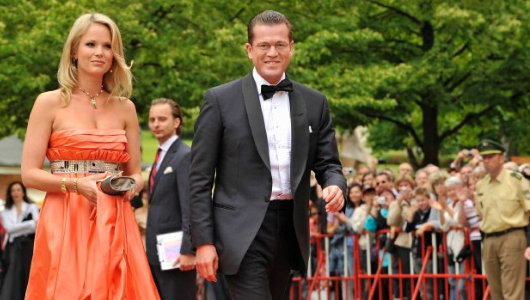
Germany’s new finance minister, Freiherr zu Guttenberg & his wife, Freifrau Stephanie.
Unmentioned by this editorial is that Baron zu Guttenberg’s grandfather (his mother’s father) was the late German winemaker & Croatian politician the Count of Vukovar. From the Count, Baron zu Guttenberg is descended from the noble house of Eltz, who are responsible for one of my favourite castles in the whole world, Burg Eltz, which once graced the 500-deutschmark note.
At the ripe age of 70, the Count of Vukovar took up arms in defence of the town of Vukovar during the Yugoslav Wars of 1991. The Count was elected to the Croatian parliament the following year as an independent, and served in that body until 1999, when he retired from politics. Nonetheless, the Croatian parliament persuaded him to accept honourary membership of parliament in his own right, in which role he continued until his death in 2006.
The Baron’s wife, meanwhile, is Stephanie, Countess of Bismarck-Schönhausen, great-great-granddaughter of the “Iron Chancellor”, Otto von Bismarck. A portent of this economics minister’s future?
David Kerr for Glasgow North East
 While the baggage-handler and much-celebrated hero of the Glasgow Airport attacks, Mr. John Smeaton QGM (“This is Glasgow; we’ll set aboot ye. … You’re no’ hitting the Polis mate, there’s nae chance.”) has announced he is going to contest the Glasgow North East by-election for some fringe electoral outfit, this blog is happy to report that there is already a perfectly laudable candidate who is seeking the privilege of serving the constituents of that district at Westminster.
While the baggage-handler and much-celebrated hero of the Glasgow Airport attacks, Mr. John Smeaton QGM (“This is Glasgow; we’ll set aboot ye. … You’re no’ hitting the Polis mate, there’s nae chance.”) has announced he is going to contest the Glasgow North East by-election for some fringe electoral outfit, this blog is happy to report that there is already a perfectly laudable candidate who is seeking the privilege of serving the constituents of that district at Westminster.
Mr. David Kerr, a Catholic graduate of the University of St Andrews and until recently a senior editor of BBC Scotland’s “Reporting Scotland” programme, is the Scottish Nationalist candidate for Glasgow North East. The Labourite newspapers have already set David Kerr as the target of their sleaze machine, first for a derogatory comment about Glasgow Caledonian University “not having a reputation to tarnish” made in a jocular spirit of inter-academic rivalry, then over a television investigation into the availability of weaponry in which Mr. Kerr was pictured with… well, weapons! (Oh, the horror! Vote Labour!)
Mr. Kerr is believed to be a favourite of SNP leader Alex Salmond, the First Minister of Scotland. The SNP are currently the only major party in mainland Britain who are actively pursuing the Catholic vote. While SNP members tend to be vaguely left-wing and pro-independence (as is the official party policy), SNP voters are often more traditional or conservative and in favour of preserving some form of union. (The Conservative Party, meanwhile, is frequently perceived as a party for liberal English toffs; a perception reinforced by David Cameron’s leadership). The Nationalists are doubtless trying to repeat their victory over Labour in last year’s Glasgow East by-election, in which ethical issues are believed to have played a significant role in Labour’s defeat.
The bookmakers Ladbrokes are currently giving David odds of 5/4 in winning the seat, against 4/6 for Labour’s Willie Bain.
‘Dim Tim’ & Chick-lit Bagshawe go twit for tat over “slobbering” devotees of Thérèse
Tim Cheetham, a Labourite councillor in the legendary south Yorkshire town of Barnsley, has expressed his disdain for the enthusiasm his fellow countrymen and women have shown for the beloved Saint Thérèse of Liseux via the medium of Twitter: “With all those slobbering zealots kissing that glass case, I hope it has some mystical power to prevent swine flu.” As Catholic Herald editor Damian Thompson states, “That’s the authentic voice of 21st-century Labour.”
Louise Bagshaw, a “chick-lit” novelist, prospective Tory party candidate, and Woldingham old girl, wasted no time in responding. “Nice to describe faithful Catholics venerating a relic as slobbering zealots. Would you use such bigoted language about Muslims?”
Cheetham’s rather lame retort: “As the church has issued new guidlines [sic] about the conduct of ceremonies to protect against spreading disease, it needed saying.”
Bagshawe: “Labour’s anti-Catholicism is breathtaking sometimes.”
Damian Thompson continues:
Another tweet from Cheetham: “It’s not Bigotry to highlight the lunacy of dark age mysticism in the modern world.” Really? OK, then let me put you on the spot, councillor.
You say: “I will decry any faith that denies my right to question it in whatever form I wish.” Well, Muslims in Barnsley do object to the slightest criticism of their Prophet (who lived during the dark ages, as it happens) with his child wives and message of violence. But you’re a brave man, it seems. So go on: speak fearlessly and with your trademark withering disdain about the zealots in your own town.
Dim Tim later tried to backtrack by blaming the medium of Twitter for his own idiotic remarks.
To my knowledge, Barnsley’s not a town short on Catholics. Let’s hope those “slobbering zealots” make it to the polling place the next time the council’s up for election.
Prague Prince Propels Pristine Party
New Grouping May Hold Balance of Power After Next Bohemian Vote
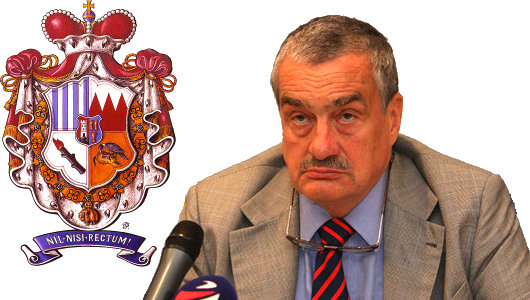
PRINCE KARL VII, current head of the House of Schwarzenberg and sometime foreign minister of the Czech Republic, recently combined with other political colleagues to form a new party in time for the upcoming parliamentary elections in Bohemia. A number of supporters of the Christian & Democratic Union – Czechoslovak People’s Party (KDU-ČSL) were disappointed with the selection of the left-leaning Cyril Svoboda as party chairman, and have formed a new conservative group, Tradice Odpovědnost Prosperita 09 or “Tradition Responsibility Prosperity ’09″.
Prince Karl — or Karel Schwarzenberg as he is known for electoral purposes — suggests that Bohemian voters have grown disenchanted with the current choice of political parties on offer. “The results of the last elections – the worst were the election to the European Parliament, but even the national elections – show that the degree of support for political parties by Czech citizens is going steadily down,” the Prince told Radio Prague.
“People are evidently not content with the parties that are offered to them, and they are more and more fed up. I read this in the e-mails I get and letters, and hear it in pubs and wherever. And as we think that there is still a lot of work to be done in our country, we decided to offer at least some alternative. That’s it.” (more…)
Search
Instagram: @andcusack
Click here for my Instagram photos.Most Recent Posts
- Telephone Kiosk No. 2 May 15, 2024
- The last of its vintage May 15, 2024
- Letters Patent May 8, 2024
- Bicycle Rack April 29, 2024
- Burns Tower April 19, 2024
Most Recent Comments
Book Wishlist
Monthly Archives
Categories


